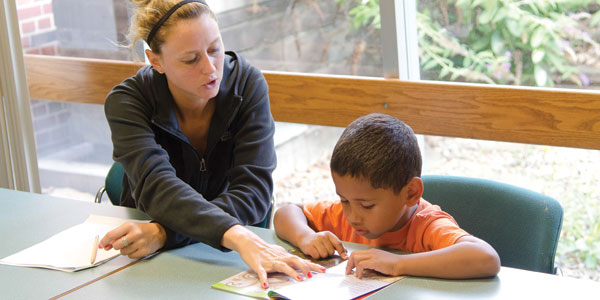Beyond Self

Kristine Conderman '10, '12G assists a young reader.
Ready to Read
Nazareth literacy programs combat summer reading loss in elementary students
by Robin L. Flanigan
In multiple ways, Nazareth College collaborated with the Rochester City School District (RCSD) last summer to make sure some of the system’s youngest students maintained—and in some cases strengthened—the literacy skills they learned the previous school year.
“We invited the children who would benefit the most and supported their developing the concepts and behaviors they need to grow as readers and writers,” says Naomi Erdmann, Ed.D., professor of language, literacy, and technology and director of Nazareth’s graduate literacy programs and the Marie Callahan Reading Clinic.
Relevant research suggests many students experience significant learning losses over summer break. The children from low-income families and/or who are learning to speak English as a second language are the most vulnerable. The most recent census data shows that Rochester ranks seventh in the nation for its percentage of poor children, and the Rochester city schools have the greatest concentration of English language learners in the region.
A meeting in October 2012 with Erdmann and RCSD Superintendent Dr. Bolgen Vargas led to Nazareth designing a four-week session on campus that supported the youngsters’ developing foundational concepts, knowledge, and habits necessary for learning to read. Principals from Schools 9 and 17 selected the kindergarteners whom they thought would flourish as emergent readers in the program.
In a supportive and playful environment, the youngsters spent four hours each weekday looking at picture books with an adult partner, participating in group activities, and rotating among learning stations. They practiced rhyming, writing their names, and drawing illustrations of their favorite words, which they then learned to read. The teachers guided their formulating sentences, engaging in conversations, developing an awareness of the relationship between letters and sounds, and a variety of other opportunities that build a strong foundation for future learning.
The result? Not one child in the literacy program experienced a summer reading loss, and all experienced significant gains.
Graduate students in the College’s Teachers of English to Speakers of Other Languages (TESOL) program have been paired with summer school classrooms for decades, and in recent years the program purchased books to give to each summer student. When funds for gift books ran out in 2012, graduate students helped launch a new initiative to increase their level of support in thwarting summer reading loss. Teacher candidates brought with them tote boxes of books—hence the initiative’s name, Books in a Box—for students to borrow. Students in both primary and secondary schools treated the totes much like a lending library, choosing books that caught their interest and that they could read independently.
“While this is, in some ways, a very small thing, it’s also extremely important because school libraries are often shut in the summer since districts can’t afford to hire librarians for the extended school year,” says Cindy McPhail, Ph.D., professor and chair of language, literacy, and technology and director of the graduate TESOL certifications and bilingual extension programs. “Due to lack of supervision, library resources often are locked away and unavailable, and some of the children don’t have easy access to their public libraries. We wanted to put books into their hands that they would find engaging. This was about exposing them to reading for the joy of reading.”
And, by taking them home, they could potentially spread that joy to younger family members. More than 3,000 books were donated by faculty, staff, students, and other members of the Nazareth community.
The 13 TESOL candidates provided an added benefit: personalized instruction from teachers already certified in other areas. Each placement lasted a minimum of 20 days.
“If we do the math, the total equivalent number of days is 260—that’s more than a school year’s worth of teaching, provided free of cost to the district,” McPhail notes. “These were experienced teachers who could go out and hit the ground running.”
Another on-campus program that got its start three years ago is showing results for its efforts to help maintain literacy levels among students from low-income families. The five-week Horizons Enrichment Program, a national venture with an emphasis on nature, the arts, and wellness, began at Nazareth with kindergartners only and is adding a new grade every summer until the original group reaches ninth grade. Next summer the program will enroll 65 students in grades one to four.
The upshot? Every year the children, most of whom are from the Discovery Charter School in Rochester, either have sustained or made growth in their reading abilities through numerous collaborations across campus, including daily interactions with graduate education students, according to Deana Darling ’96G, director of Horizons and assistant clinical professor in inclusive childhood education.
One of the initial students was accepted conditionally because, as a kindergartner, he had multiple disciplinary referrals and was deemed uncooperative. Once reading below grade level, the boy, who has participated every summer, now reads above grade level—and has become a student leader at his home school and in the Horizons program.
“I look at him, and he’s the reason why this program exists,” Darling says. “He has been allowed to achieve his potential through a very supportive network, and now the sky’s the limit for him.”
That boy is now in third grade. Research clearly shows that children who aren’t proficient at reading by third grade are less likely to graduate high school.
“Independent reading may be viewed as a simple thing, but it’s often the simplest things that can make a profound impact on our daily lives,” says McPhail, adding that reading can both increase vocabulary and grammar skills as well as help spark curiosity and foster empathy.
“We’re providing resources that the participating students just don’t have access to,” she adds. “You have to have a foundation. And these programs are all about trying to build that foundation.”
Robin L. Flanigan is a freelance writer in Rochester, New York.